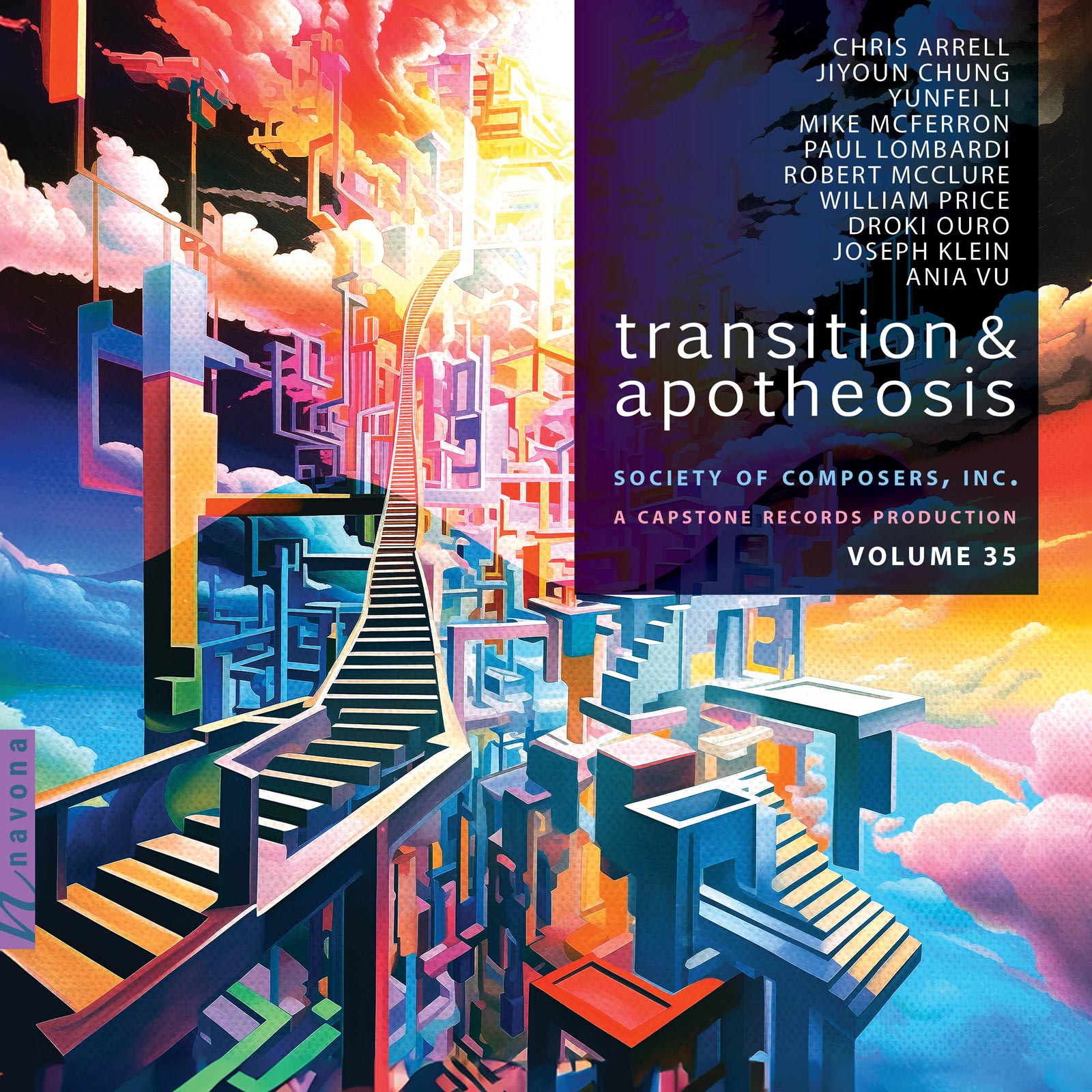Transition and Apotheosis
Chris Arrell composer
Jiyoun Chung composer
Yunfei Li composer
Mike McFerron composer
Paul Lombardi composer
Robert McClure composer
William Price composer
Droki Ouro composer
Joseph Klein composer
Ania Vu composer
Society of Composers, Inc. presents 10 works from boundary-defying composers on TRANSITION AND APOTHEOSIS, the 35th installment of their celebrated Composers’ Series.
Carnyx from Chris Arrell employs the carnyx, the ceremonial and battle trumpet used by Iron Age Celts, to conjure the terror of an army encroaching through the morning mist. Jiyoun Chung’s Scissors is a fantasia-toccata for solo piano inspired by the traditional Korean Scissors dance. 24/7 by Yunfei Li honors the healthcare professionals who served on the frontlines of the COVID-19 pandemic. Transition and Apotheosis from Mike McFerron is a multichannel fixed media piece that maps Danish composer Per Nørgård’s “infinity sequence” to sound elements. Paul Lombardi’s Unwoven incorporates the fractal-like technique used in his past pieces to startling new effects. Robert McClure’s struggling in excess decries the vast amounts of waste humans produce on a daily basis. glass, evaporate[d] from Droki Ouro is a hauntingly beautiful reimagining of 2019’s lips evaporate. William Price’s Sans Titre VII (B) is a modified variation-rondo that explores the wide range, technical agility, and unique extended techniques offered by the saxophone. Der Saus und Braus by Joseph Klein is the sixteenth in a series of short works for solo instruments based on characters in Elias Canetti’s Der Ohrenzeuge: Fünfzig Charaktere (Earwitness: Fifty Characters). Finally, Ania Vu’s Tik-Tak sets the composer’s Polish poem to remind us of the relentless flow of time.
SCI renews its decades-long mission to promote and disseminate contemporary music in this Navona Records release.
Listen
Stream/Buy
Choose your platform
Track Listing & Credits
| # | Title | Composer | Performer | |
|---|---|---|---|---|
| 01 | Carnyx | Chris Arrell | fixed media | 5:23 |
| 02 | Scissors Fantasia Toccata | Jiyoun Chung | April Kim, piano | 6:24 |
| 03 | 24/7 | Yunfei Li | Gabriella Roderer, flute; Thomas Lacy, oboe; Nuvee Thammikasakul, clarinet; Lucas Testin, horn in F; Andrew West, bassoon | 7:18 |
| 04 | Transition and Apotheosis | Mike McFerron | fixed media | 8:10 |
| 05 | Unwoven | Paul Lombardi | The Víquez-Wadley Duo | Luis Víquez, bass clarinet; Darin Wadley, vibraphone | 7:14 |
| 06 | struggling in excess | Robert McClure | Michele Fiala, oboe; fixed media | 7:58 |
| 07 | glass, evaporate[d] | Droki Ouro | Jacob Mason, three tuned pianos | 4:41 |
| 08 | Sans Titre VII (B) | William Price | Brian Utley, alto saxophone | 11:49 |
| 09 | Der Saus und Braus | Joseph Klein | Redi Llupa, piano | 5:29 |
| 10 | Tik-Tak | Ania Vu | The Tak Ensemble | Charlotte Mundy, soprano; Laura Cocks, flute; Carlos Cordeiro, clarinet; Marina Kifferstein, violin; Ellery Trafford, percussion | 4:55 |
Dedicated to Gerald Warfield, general manager for the Society of Composers, Inc. 1977-2020 — many thanks for all you did for SCI.
Carnyx (2017)
Recording Session Producer & Engineer Chris Arrell
Scissors Fantasia Toccata
Recorded February 28, 2020 at Urness Recital Hall, St. Olaf College in Northfield MN
Recording Session Engineer Aleks Jenner
24/7
Recorded in White Hall at University of Missouri, Kansas City Conservatory in Kansas City MO
Recording Session Engineer Bob Beck
Transition and Apotheosis
Recorded at Bigcomposer Studios
Recording Session Producer & Engineer Mike McFerron
Unwoven (2020)
Recorded February, 2021 at Colton Recital Hall, University of South Dakota in Vermillion SD
Recording Session Engineer & Mastering Paul Lombardi
struggling in excess
Recorded at Glidden Recital Hall, Ohio University School of Music in Athens OH
Recording Session Producer & Engineer Robert McClure
glass, evaporate[d]
Recorded June 1st, 2020 at Jacob Mason Studios in Miami FL
Recording Session Engineer Jacob Mason
Sans Titre VII (B)
Recorded May 19, 2017 at the University of Alabama, Birmingham Recording Studio in Birmingham AL
Recording Session Engineer James Bevelle
Der Saus und Braus (2017)
Recorded March 9 2019 at Voertman Concert Hall, University of North Texas in Denton TX
Recording Session Producer Joseph Klein
Recording Session Engineers Mark Vaughn, Christopher Poovey
Technical Assistant Ermir Bejo
Tik-Tak
Recorded March 16, 2019 in Arch 208 Auditorium, University of Pennsylvania in Philadelphia PA
Recording Session Engineer Eugene Lew
Mixing Ania Vu
Mastering Melanie Montgomery
Producer Frank Felice
SCI President Beth Weimann
SCI Executive Committee Chair Frank Felice
Executive Producer Bob Lord
VP of A&R Brandon MacNeil
VP of Production Jan Košulič
Audio Director Lucas Paquette
VP, Design & Marketing Brett Picknell
Art Director Ryan Harrison
Design Edward A. Fleming
Publicity Aidan Curran
Artist Information

Society Of Composers, Inc.
The Society of Composers, Inc. is a professional society dedicated to the promotion, performance, understanding, and dissemination of new and contemporary music. Members include composers both in and outside academia interested in addressing these issues on a national and regional level. The governing body of the Society consists of a National Council made up of co-chairs who represent regional activities, and an Executive Committee made up of the editors and directors of Society publications and projects. We are actively promoting new music through conferences, festivals, publishing of scores, contests, and the release of members’ recordings.
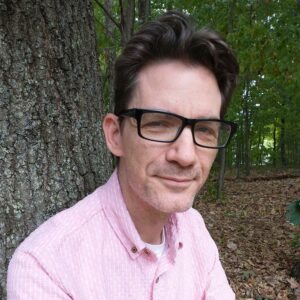
Chris Arrell
Chris Arrell (b. 1970, Portland OR) composes music for throats, fingers, and oscillators that celebrates the blurring of lines between human and machine, the natural and the digital, and the popular versus the avant-garde. His music, praised for its nuance and unconventional beauty (New Music Box, Boston Music Intelligencer, Atlanta Journal-Constitution), has led to commissions from the Alte Schmiede (Austria), Boston Musica Viva, MATA, Spivey Hall, Cornell University, and the Fromm Foundation. A winner of the Ettelson Composer Award for his work Of Three Minds, he holds additional honors from Ossia Music, the League of Composers/ISCM, the Salvatore Martirano Competition, the MacDowell and ACA colonies, and the Fulbright Hays Foundation. His music is available from Beauport Classical, Electroshock Records, Navona Records, PARMA Recordings, and Trevco Music. Arrell is an associate professor at the College of The Holy Cross in Worcester MA.

Jiyoun Chung
The work of composer and pianist Jiyoun Chung (b. 1982, South Korea) has received many distinctions and awards and is often heard in festivals and concerts in Asia, Europe, and the United States. Her current interest in composition lies in incorporating various cultural influences into her works. Her own identity as a Korean immigrant plays a big factor in her music making. Having two different cultural perspectives as she has enculturated into the United States allows her to see one culture as an abundant source of inspiration from the point of view of the other. Thus, embracing both in the compositional process comes naturally to her. However, Chung’s works are not limited to the fusion of Korean and concert music. While she derives much from East Asian culture, other inspiration comes from contemporary concert music, K-pop, jazz, musical theater, hip-hop, street music, and world traditional music. Languages, structures, timbres, and vocabularies from those different musical arts have expanded her palette, which helps her speak to a broad range of audiences. Chung received her B.M. in Composition from Hanyang University in South Korea. She earned her M.M. in Composition and in Piano Performance from Illinois State University, studying with Carl Schimmel and Martha Horst. She received her D.M.A. in Composition at the University of Missouri-Kansas City, where she studied with Chen Yi, Zhou Long, and James Mobberley. She is an Assistant Professor of Music at Central Washington University.

Yunfei Li
Yunfei Li is a composer and violinist based in Kansas City MO. Li writes music that explores new sounds on instruments and music software. She takes inspiration from the sounds of nature and has converted nature sounds into musical language as part of her original compositions. With a background that includes both Eastern and Western classical music, she is also inspired by a variety of modern music styles including pop, electroacoustic, and film music. As a composer, she has collaborated with film directors, writers, choreographers, and multimedia artists.
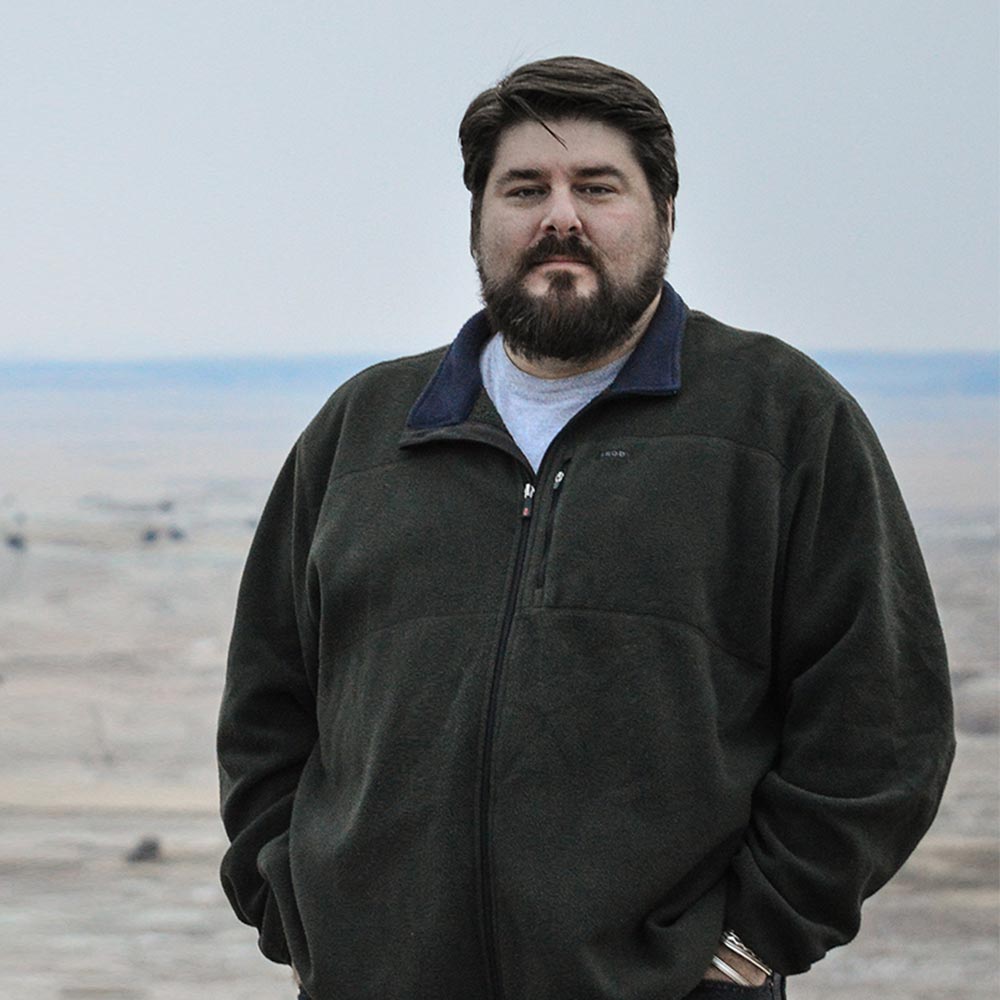
Mike McFerron
Mike McFerron is professor of music and composer-in-residence at Lewis University and he is founder and co-director of Electronic Music Midwest (emmfestival.org). McFerron’s music has received critical acclaim and recognition. His music has been performed by the Remarkable Theater Brigade (Carnegie Hall), the Louisville Orchestra, the Civic Orchestra of Chicago, and Cantus among many others.
He serves on the board of the directors for the Metropolitan Youth Symphony Orchestra and is a past Chair of the Executive Committee for the Society of Composers, Inc. McFerron’s music can be heard on numerous commercial recordings as well as on his website at bigcomposer.com
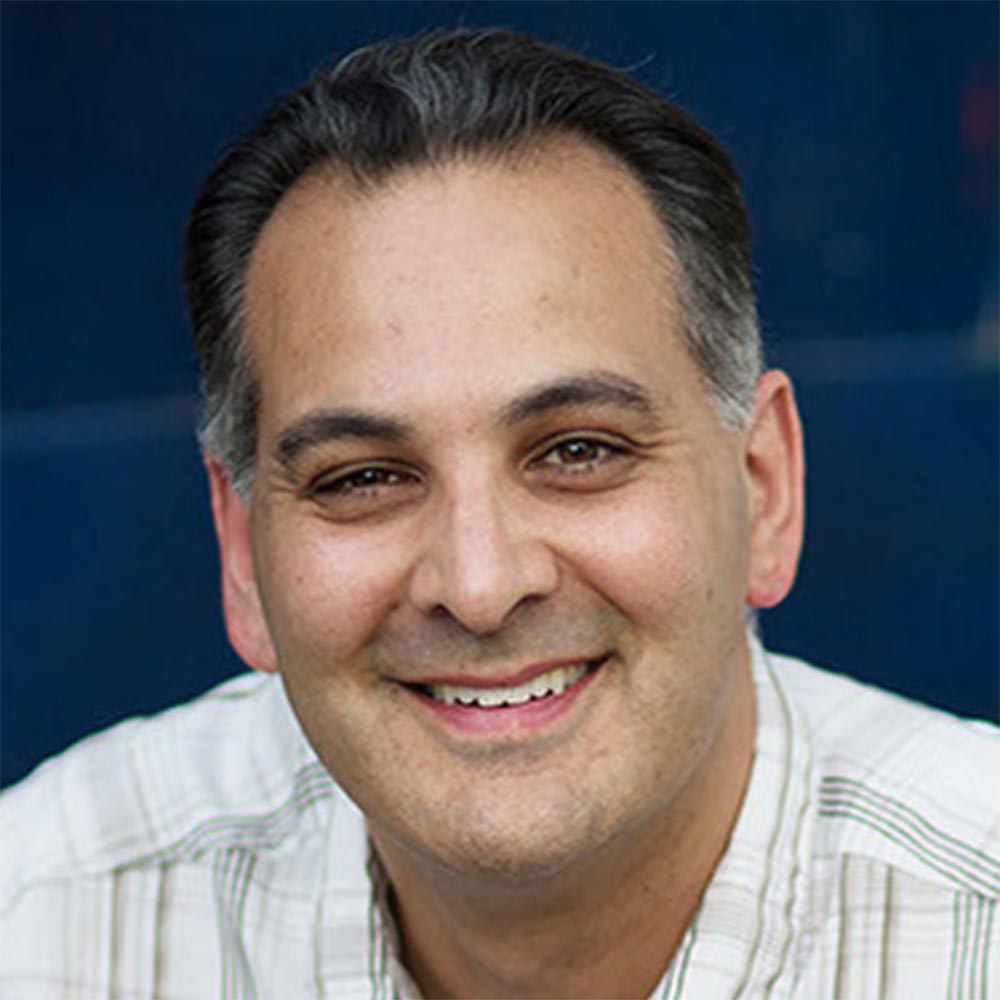
Paul Lombardi
Paul Lombardi holds a Ph.D. in music composition from the University of Oregon, and studied composition with David Crumb, Robert Kyr, Stephen Blumberg, and Leo Eylar. His music has been performed in more than 30 states across the US, as well as in other areas in North America, South America, Europe, and Australia. Recordings of his music are available from Parma Recordings, Capstone Records, Revell Records, Zerx Records, Mark Records, ERMMedia, and Thinking outLOUD Records.

Robert McClure
Robert McClure’s music attempts to discover beauty in unconventional places using non-traditional means. His work has been featured at festivals including NYCEMF, Beijing Modern Music Festival, ISCM, TIES, SEAMUS, and ICMC. His works may be found through ADJ·ective New Music, Bachovich Music Publications, Resolute Music Publications, and Tapspace Publications as well as on ABLAZE, Albany, and New Focus Record labels.
Robert received his doctorate from Rice University’s Shepherd School of Music. Robert has previously held positions at the Shanghai Conservatory of Music and Soochow University in Suzhou, China. He serves as Associate Professor of Composition/Theory at Ohio University.

Droki Ouro
Droki Ouro is a composer framing pictorial properties found in visual art, namely color, shape, balance, and space, with organizing principles of philosophical, sociological, and metaphysical intent. These elements forge aural convictions that engage with intersectional experiences related to persecution, assimilation, and masking – a self-portrait. Their music has been described as “beautifully haunting” (Robert Avalon Competition), “patiently evocative” (George Lewis), and “unsettling, [yet] interesting” (Joshua Weatherspoon, Cycling ’74), and has been performed by Hypercube, Duo Sequenza, and ensemble vim. Ouro has been featured at several festivals including the Aspen Music Festival, SEAMUS, and ICMC and has been commercially released with several labels including Navona Records, PARMA Recordings, Petrichor Records, and RMN Music.
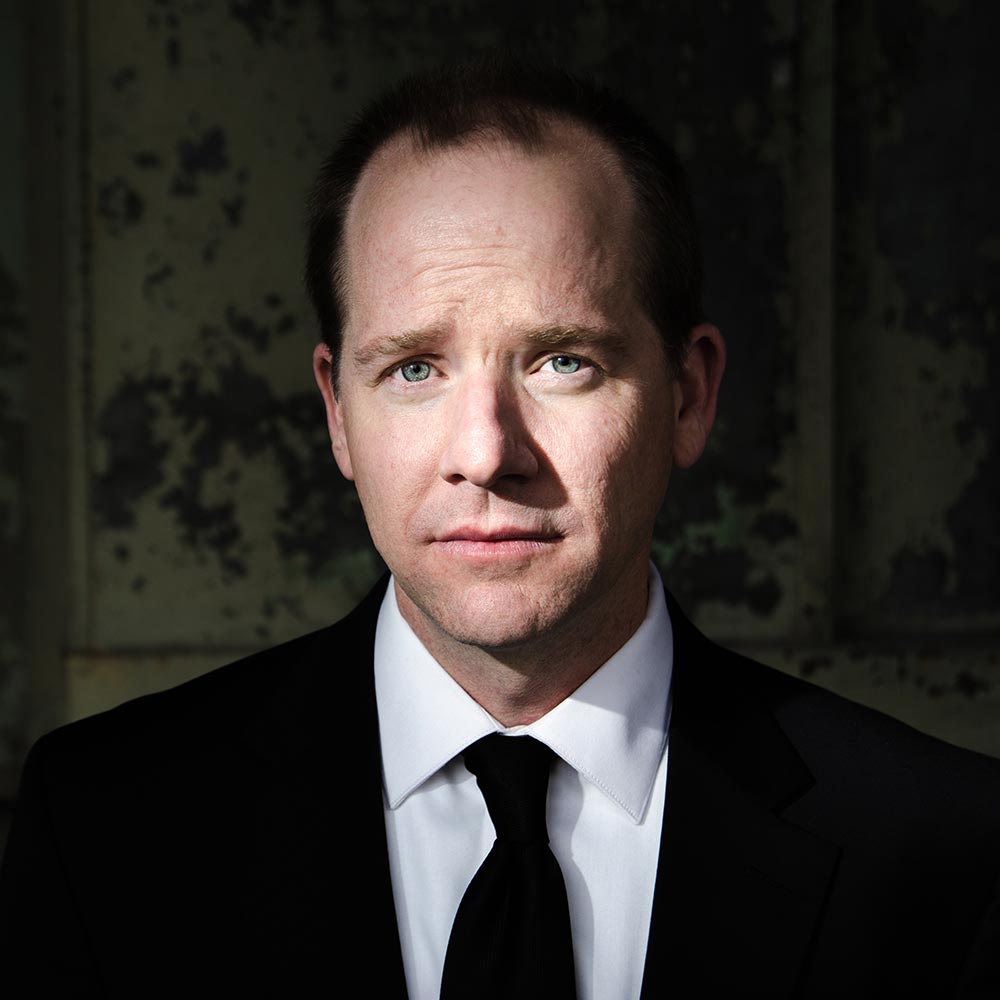
William Price
William Price’s music has been featured at numerous international events, including the World Saxophone Congress, the International Trumpet Guild Conference, the International Saxophone Symposium, the International Computer Music Festival, Ars Electronica Forum Wallis, the Musica Viva Festival in Portugal, the Musinfo Journées Art & Science in France, the Festival Internacional de la Imagen in Colombia, and the Nanyang Academy of Fine Arts Chamber Music Festival in Singapore.

Joseph Klein
Born in Los Angeles in 1962, Joseph Klein is a composer of solo, chamber, and large ensemble works, including instrumental, vocal, electroacoustic, and intermedia compositions. His music — which has been described as “a dizzying euphoria… like a sonic tickling with counterpoint gone awry” (NewMusicBox) and exhibiting a “confident polyvalence [that] heightens its very real excitement” (The Wire) — reflects an ongoing interest in processes drawn from such sources as fractal geometry, chaos, and systems theory, often inspired by natural phenomena. His works frequently incorporate theatrical elements, either as an extension of the extra-musical references or as an organic expression of the musical narrative itself. Literature is another important influence on his work, with recent compositions based on the writings of Franz Kafka, Elias Canetti, Alice Fulton, W.S. Merwin, Milan Kundera, and John Ashbery.

Ania Vu
Ania Vu (née Vũ Đặng Minh Anh) is a composer-pianist from Poland of Vietnamese descent. Her work searches for connections between music and language, the sounds of the natural world, and varied perceptions of time. An avid cross-field collaborator, she has worked with writers, dancers, choreographers, visual artists, and filmmakers. She often creates her own texts (in Polish and English), which fuels her musical creativity – a method she calls “composing text to write music.” The Boston Globe has described her music as featuring “artful vocal writing [that] ranges from percussive whispers to glinting, pure-voiced lines that […] blended elegantly into the roiling cauldron of strings.” Her work has been recognized by Tanglewood, ASCAP, the American Opera Project, Copland House, Boston New Music Initiative, and I-Park Foundation, and she has worked with the New Fromm Players, Grossman Ensemble, DanceWorks Chicago, Daedalus and Mivos Quartets, Sō Percussion, and the TAK Ensemble, among others. She was the University of Chicago’s Postdoctoral Researcher and Fellow of “Composers and the Voice,” which provides experience in writing for the voice and opera stage. Vu received her degrees from the University of Pennsylvania and the Eastman School of Music, and has taught at the University of Texas at Austin, the University of Chicago, and the University of Pennsylvania.
